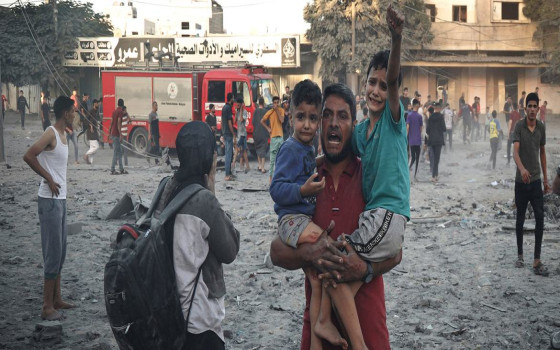
UN calls for end to 'unimaginable' suffering since October 7 attack.. Israeli response brought destruction and catastrophe to Palestinians

- Europe and Arabs
- Monday , 7 October 2024 11:20 AM GMT
Gaza - New York: Europe and the Arabs
"A year has passed since the bloodiest attack in Israel's history, launched by Hamas and other Palestinian armed groups," the United Nations Office for the Coordination of Humanitarian Affairs said on the anniversary of "the deadliest attack in Israel's history." The office said the attack was a horrific event that "foreshadowed the devastation that the Israeli response would bring."
In a press release, the UN office, known as OCHA, said the toll was staggering: "According to Israeli sources, more than 1,200 Israelis and foreigners, including children, were killed and some 5,500 were injured. Dozens of hostages are still being held in Gaza."
The office pointed to reports that hostages are being treated inhumanely - including sexual violence - and are being subjected to hostilities and denied humanitarian aid or visits from the International Committee of the Red Cross. It said that entire Israeli communities have been evacuated and their residents live under the constant threat of indiscriminate rocket fire. “In Gaza, where Palestinians have been suffering under a 17-year land, air and sea blockade and repeated rounds of hostilities, the Israeli military operations have been catastrophic,” the UN Office for the Coordination of Humanitarian Affairs said.
The UN Office noted that the Ministry of Health in Gaza reported that more than 41,600 Palestinians, many of them women and children, had been killed and 96,000 injured, while thousands more remain missing and are believed to be trapped under the rubble.
The office said that almost all of Gaza’s population has been displaced, many multiple times, with no safe place to go. It said that thousands of Palestinians are being held in arbitrary detention, reportedly subjected to torture and inhumane treatment, with no information available about their whereabouts.
In its statement, the UN Office for the Coordination of Humanitarian Affairs said that civilians face extreme deprivation with limited or no access to health care, food, electricity and humanitarian assistance, while children have lost an entire year of education. OCHA noted that schools sheltering displaced families have been repeatedly bombed, health workers and hospitals have been systematically attacked and aid convoys have been continually obstructed and “even fired upon.” “In the West Bank, the use of lethal force by Israeli forces, rampant settler violence and home demolitions have led to a sharp increase in the death toll, widespread destruction and forced displacement,” it said. “No statistics or words can fully express the extent of the psychological, mental and societal devastation that has occurred, but we know what must be done:
Release the hostages and treat them humanely.
Protect civilians and meet their basic needs.
Release Palestinians who remain arbitrarily detained.
Protect humanitarian workers and facilitate their work.
Hold perpetrators accountable for any serious violations of international humanitarian law.
The assault on Gaza must stop,” said Joyce Msuya, Acting Under-Secretary-General for Humanitarian Affairs and Emergency Relief Coordinator.
The UN office noted that over the past year, Israel has blocked humanitarian access to and within Gaza, disrupting aid delivery, “and as a result, vulnerable populations have been left to fend for themselves, to starve, to death.”
The office said more than 300 aid workers had been killed in Gaza – the vast majority of them staff of the United Nations Relief and Works Agency for Palestine Refugees in the Near East (UNRWA) – more than in any single crisis, making Gaza the most dangerous place for humanitarian workers.
Despite the enormous risks – including violence, looting of supplies and challenges to access – the office said humanitarian agencies were continuing to provide assistance when and where they could.
It noted that more than 560,000 children had been vaccinated against polio during the first round of an emergency vaccination campaign – an example of what can be achieved when aid workers have access to those in need. But it said these examples were few in number.
“It has been 12 months since this tragedy began, and it continues unabated,” said UN official Joyce Msuya. “Member States must exercise their influence to ensure respect for international humanitarian law and human rights and compliance with the rulings of the International Court of Justice. They must also work to end impunity. It has taken far too long for an immediate ceasefire and lasting peace.”












No Comments Found